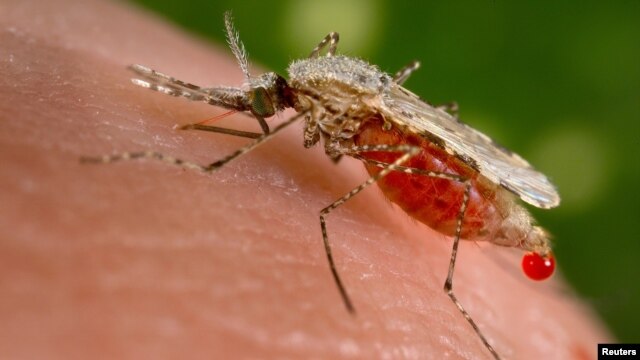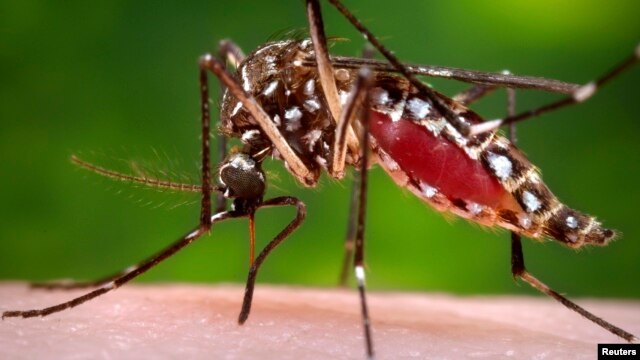Navigation
Install the app
How to install the app on iOS
Follow along with the video below to see how to install our site as a web app on your home screen.

Note: This feature currently requires accessing the site using the built-in Safari browser.
More options
You are using an out of date browser. It may not display this or other websites correctly.
You should upgrade or use an alternative browser.
You should upgrade or use an alternative browser.
If you're a type O secretor, to a mosquito you look like caramel-covered crack.
- Thread starter RadiomanATL
- Start date
that was interesting....as a type a...i have noticed the fact that friends are eaten alive...while i am not....now to just be sure to take a type o secretor on fishing trips and the like...and i am good to go.
i love the conflicting results.
i love the conflicting results.
Malaria hope: Resistant mosquito...

Malaria hope: Bacteria that make mosquitoes resistant
9 May 2013 - Researchers have found a strain of bacteria that can infect mosquitoes and make them resistant to the malaria parasite.
Malaria hope: Bacteria that make mosquitoes resistant
9 May 2013 - Researchers have found a strain of bacteria that can infect mosquitoes and make them resistant to the malaria parasite.
The study, in the journal Science, showed the parasite struggled to survive in infected mosquitoes. Malaria is spread between people by the insects so it is hoped that giving mosquitoes malaria immunity could reduce human cases. Experts said this was a first, distant prospect for malaria control. Malaria is a major global disease. The World Health Organisation estimates that 220 million people are infected annually and 660,000 die.
Challenge
The study at Michigan State University in the US looked at the Wolbachia bacterium, which commonly infects insects. It passes only from females to their offspring. In some insects the bug is exceptionally good at manipulating insects to boost the number of females for its own ends. Wolbachia kills male embryos in some butterflies and ladybirds. In other situations, it can produce males that can breed only with infected females, and even allows some female wasps to give birth without mating. Malaria-carrying Anopheles mosquitoes are not naturally plagued by Wolbachia, yet laboratory studies have shown that temporary infection made the insects immune to the malaria parasite.
The challenge was to turn a temporary infection into one that would be passed on. The research team found a strain of Wolbachia that could persist in one species of mosquito, Anopheles stephensi, for the entire length of the study - 34 generations. Malaria parasites found it difficult to cope in these mosquitoes, with parasite levels fourfold lower than in uninfected bugs. Research in Australia has shown that a different strain of Wolbachia can prevent the spread of dengue fever by mosquitoes. That research is more advanced and has been shown to work in large trials in the wild.
Dr Anthony Fauci, director of the National Institute of Allergy and Infectious Diseases in the US, said this study was a proof of concept that the same could be done for malaria. "If you can get it to survive and proliferate in the environment of mosquitoes in malaria-stricken areas, this could conceivably have an important impact on the control of malaria. "I think the potential for this is very important. The implementation will be the challenge."
'Struggle to spread'
hortysir
In Memorial of 47
O+ here and while everyone else is gettin' ate up, I'm usually left alone
*shrug*
*shrug*
A more effective and less expensive mosquito repellent...

Promising Mosquito Repellent Announced
January 03, 2014 ~ In many regions of the world, mosquitoes are a seasonal pest. In other regions, they carry serious diseases like malaria.
Promising Mosquito Repellent Announced
January 03, 2014 ~ In many regions of the world, mosquitoes are a seasonal pest. In other regions, they carry serious diseases like malaria.
The World Health Organization estimates that almost 630,000 people died of malaria-related causes in 2012, mostly in Sub-Saharan Africa. Now, a group of U.S.-based scientists is working to develop a more effective and less expensive mosquito repellent than currently in use.
The research, at the University of California Riverside, is based on the fact that mosquitoes use the same receptor for detecting carbon dioxide in our breath as they do for the odor from our skin when they come closer.
The lead investigator, Anandasankar Ray, says scientists tested more than a million chemical compounds until they found a substance called Ethyl pyruvate that shuts down the mosquitoes receptor. When we apply Ethyl pyruvate to a human arm and offer it to hungry mosquitoes in a cage, then very few of the mosquitoes are attracted to the human arm because only a few of them are able to smell it out," said Ray.
Genevieve Tauxe, also on the team, says finding the mosquito neurons that detect both our breath and skin odor was not easy. With this apparatus, we are able to insert a very small electrode into the part of the mosquito's nose, effectively, where its olfactory neurons are and where the smell is happening," said Tauxe. With these instruments, scientists were able to detect the signals that a mosquitos neurons send to its brain when it senses attractive odors. Spikes on the computer screen show when the attraction is strong or weak.
Ray says a repellent based on Ethyl pyruvate may be cheaper to manufacture than DEET, the most effective chemical now in use. He says it's too expensive for most people in malaria-affected areas. "Perhaps by finding designer odors, better odors that can attack other target receptors, we will be able to improve upon DEET and finally have the next generation of insect behavior control product," he said. The University of California scientists say they believe they will soon be able to find a way to manufacture cheaper and more effective repellents for the fight against mosquitoes.
Promising Mosquito Repellent Announced
Esmeralda
Diamond Member
I don't know what blood type I am, but mosquitoes love my blood. Unfortunately.
Vox
Gold Member
- Jun 17, 2013
- 10,937
- 867
- 138
not true, btw. about mosquitoes and blood type.
the study had too many biases and was discarded long time ago. it was in 1972
No matter how many there are when I feel them on my skin, I swat 'em before they can get a drop of my blood.
Brazil dealing with mosquito-borne microencephaly threat...
Brazil Declares Emergency Over Mosquito-related Brain Damage Births
December 24, 2015 - Brazilian health authorities are expressing grave concern and have declared a state of emergency, following the birth of 2,400 babies with small heads.
See also:
Brazil Grapples With Mosquito-borne Virus
December 24, 2015 - Brazil is warning pregnant women to stay inside and avoid mosquito bites during the upcoming summer season, due to an apparent link between the spread of a mosquito-borne virus and babies born with birth defects.
Brazil Declares Emergency Over Mosquito-related Brain Damage Births
December 24, 2015 - Brazilian health authorities are expressing grave concern and have declared a state of emergency, following the birth of 2,400 babies with small heads.
The babies have been born with a condition called microcephaly, which causes severe brain damage. Twenty-nine have died. The culprit appears to be a virus carried by mosquitoes. Known as new West Nile virus, the disease was first identified in monkeys in Africa 70 years ago. While causing mostly mild symptoms in adults, the disease can produce severe neurological damage in newborns.

An Anopheles stephensi mosquito obtains a blood meal from a human host through its pointed proboscis
The pathogen was reportedly found in the amniotic fluid in two women carrying babies with microcephaly. The World Health Organization is monitoring the situation closely. Cases began cropping up in Brazil in May. More than 150 Brazilian infants were born with microcephaly in 2014.
Scientists are blaming subtle effects of climate change for spreading the disease. In recent years, West Nile virus has spread to the Pacific Ocean, where it infected 11,000 residents on the island of Yap. It sickened at least 28,000 people in Tahiti and West Polynesia.
Brazil Declares Emergency Over Mosquito-related Brain Damage Births
See also:
Brazil Grapples With Mosquito-borne Virus
December 24, 2015 - Brazil is warning pregnant women to stay inside and avoid mosquito bites during the upcoming summer season, due to an apparent link between the spread of a mosquito-borne virus and babies born with birth defects.
Brazil's Health Ministry reported this week that it has recorded up to 2,782 cases of microencephaly-- or, abnormally small skulls -- in newborns this year, compared to only 147 cases recorded last year. The condition can cause developmental issues and sometimes early death. Doctors are investigating some 29 infant deaths this year from microencephaly.

A female Aedes aegypti mosquito is shown in this Center for Disease Control photograph.
The cases are believed to have been linked to the mother's infection with the Zika virus while pregnant. The virus is spread by mosquito bite and causes a mild rash and body aches. Brazil has found cases of microencephaly in 20 of its 27 states, notably in the state of Pernambuco, where there were 1,031 cases and three deaths from the condition. In the state of Paraiba, there were 429 recorded cases and five deaths. Six states, including Pernambuco, have declared states of emergency.
Medical researchers in November announced they had found the Zika virus in a baby born with microencephaly, establishing a link between the virus and the birth condition. Summer began on Tuesday in the southern hemisphere, and with the rise of warm weather, officials are sending health agents door-to-door with larvicide to help people eliminate potential breeding grounds for mosquitos. In addition, officials are telling people to put off any pregnancy plans if they can.
Brazil Grapples With Mosquito-borne Virus
Similar threads
- Replies
- 37
- Views
- 1K
- Replies
- 5
- Views
- 662
- Replies
- 127
- Views
- 2K
- Replies
- 210
- Views
- 3K
Latest Discussions
- Replies
- 2
- Views
- 8
- Replies
- 27
- Views
- 85
- Replies
- 1K
- Views
- 14K
Forum List
-
-
-
-
-
Political Satire 8037
-
-
-
-
-
-
-
-
-
-
-
-
-
-
-
-
-
-
-
ObamaCare 781
-
-
-
-
-
-
-
-
-
-
-
Member Usernotes 468
-
-
-
-
-
-
-
-
-
-
